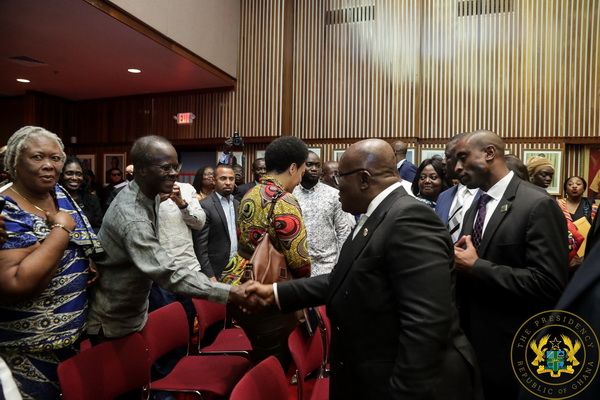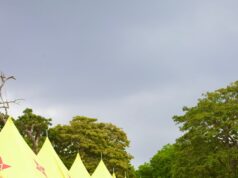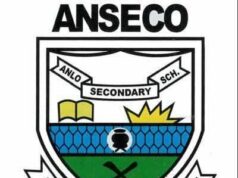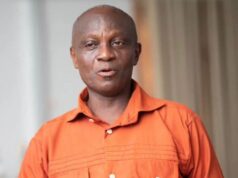A town hall meeting between President Nana Addo Dankwa Akufo-Addo and the Ghanaian community in Washington DC, USA, has been organised to offer a first-time opportunity for a face to face interaction.
The meeting at the Ghana Embassy in the USA last Friday attracted various Ghanaian associations in and around the tri-states of Washington, Maryland and Virginia.
At the full to capacity auditorium were also the Minister of Tourism, Arts and Culture, Mrs Catherine Afeku, Dr Papa Kwesi Nduom, President of the Groupe Nduom and 2016 and 2012 presidential candidate of the Progressive People’s Party (PPP), Ghana’s Ambassador to the US, Dr Baffuor Adjei-Bawuah and the Executive Secretary at the Presidency, Mr Asante Bediatuo.
The meeting which best expressed good governance at the doorstep of the people saw participants asking a broad range of questions from the economy, infrastructure development, education and health care which were all answered by the President.
Below are excerpts of the interaction in question and answer (Q&A) form that took place at the meeting at the Ghana Embassy in Washington.
Question: What are plans to improve the road system in the country and when will the Eastern corridor road be completed?
Pres. Answer: As to what we need to do to give a significant enhancement to our road infrastructure and of course the big issue about the completion of the Eastern Corridor road.
The main aim of this facility, the barter arrangement we made with the Government of China, is about the funds for developing our roads.
Virtually all the key interchanges in the country, including the Eastern Corridor road, are part and parcel of the arrangement we are making with Sino Hydro.
That arrangement essentially is that the Chinese government is going to advance us 2 billion dollars. The first tranche of 300 million dollars will be available between now and December which we are going to use to address the road infrastructure.
The arrangement is that within the first three years of the facility the barter arrangement will be suspended whilst we build the infrastructure for the development of our Bauxite resources.
Decision on Bauxite
We have taken the decision that we are not going to enter arrangements with anybody anymore which is contingent on the exploitation of our raw materials.
We are going to have our raw materials developed inside Ghana and that is the arrangement we have made with Sino Hydro and we will have the time to build the refinery, expand the smelter and be able to send to China as compensation for the facility, aluminium products so that the full value chain of our bauxite resources are going to be exploited and dealt with inside the country. That is the arrangement we have.
 President Akufo-Addo exchanging pleasantries with Dr Paa Kwesi Nduom at the meeting with the Ghanaian community
President Akufo-Addo exchanging pleasantries with Dr Paa Kwesi Nduom at the meeting with the Ghanaian community
Question: How are you going to sustain the Free Senior High School policy?
Pres. Answer: The Free Senior High School (SHS) system so far is being financed out of government revenues.
As you can see even in the first year of our government, the size of the Ghanaian economy expanded by some almost about 20 per cent. About 160-billion-cedi economy was within a year expanded to 205-billion-cedi economy.
So that also provides the space to be able to sustain the free SHS programme.
As far as I am concerned, the best way of using the oil revenue we get in Ghana is to use the revenue to sustain the free SHS system.
It is the most equitable and most sustainable way of dealing with those revenues. We are going to make sure that those revenues do not go into my pockets or the pockets of my ministers; rather we will use it to finance the free SHS system.
Question: How is the creation and development of the new regions going to proceed?
Pres. Answer: Regarding the development of the new regions, the infrastructure that will be required to set up the new regions will be captured in this year’s budget. All six regions will be captured on the assumption that we are going to get a positive vote on December 27, this year.
If the budget that is going to be read in November, this year, is approved by the time the vote on the regions comes in place, the funds will be there to develop these new regions.
That is why I created the Minister Responsible for Regional Reorganisation and Development because I anticipated that once the reorganisation has taken place we will need somebody to supervise the regions into life.
Question: What are the plans to improve universal health care in the country?
Pres. Answer: One important aspect which is already taking place is with more prudent management of the National Health Insurance System (NHIS). With prudent management of the scheme we are able to pay down the debt. Once we able to pay down the debt systematically, we are freeing up the revenue stream from the NHIS to be able to keep current obligations because that is the heart of the scheme.
If the service providers are being paid on current basis, then the service will continue and will not be jeopardized.
I think more than anything else, strict financial management, finding ways to cut down corruption, digitizing the process of NHIS; these are the way forward for us to be able to have an NHIS that will enable us to reach the goal of universal health coverage in the country.
Question: What is the government doing to encourage the diaspora to invest in Ghana?
Pres. Answer: Those in the diaspora are generally our first investors. For the first time, we have established a diaspora office at the heart of the presidency which is acting as the link and fulcrum for engaging with the diaspora community and then also indicate to the diaspora community the various incentives in Ghana’s investment act.
Question: What is the government doing about the port charges?
Pres. Answer: The port charges which have been a problem for some time are being looked at so that we can have a more competitive port regime.
For myself, I think that the time is long over due for that exercise of review to take place.
Question: How are Ghanaians in the diaspora going to be registered by the National Identity Authority (NIA)?
Pres. Answer: On the National Identity Card, I believe the programme that the NIA has put in place is that once they have completed the registration of those of us at home, I believe they will then systematically register all Ghanaians abroad.
It is important we keep reminding the NIA that there is the need for them to complete this exercise on time before the next election so that everybody here in the diaspora will have a Ghana card identifying them to be able to vote.
Question: When are you going to address our petition to review the conversion of all male-halls at the Kwame Nkrumah University of Science and Technology (KNUST) into mixed ones. The Alumni and residents of the University and Unity Halls at the KNUST are still battling with the University over the conversion of the all-male halls into mixed halls, although the university has fully rolled out the conversion.
Pres. Answer: I have taken action on the Katanga petition already. Let me tell you what I have done.
I have asked the Minister of Education to take the matter back to the University Council of KNUST for the council to take a look at the matter again as soon as possible.
“I am fascinated to see that women are in your midst,” the President told the US Chapter of KNUST Alumni who had besieged the Town hall meeting demonstrating against the decision by the university’s management to convert the halls into mixed halls.





























